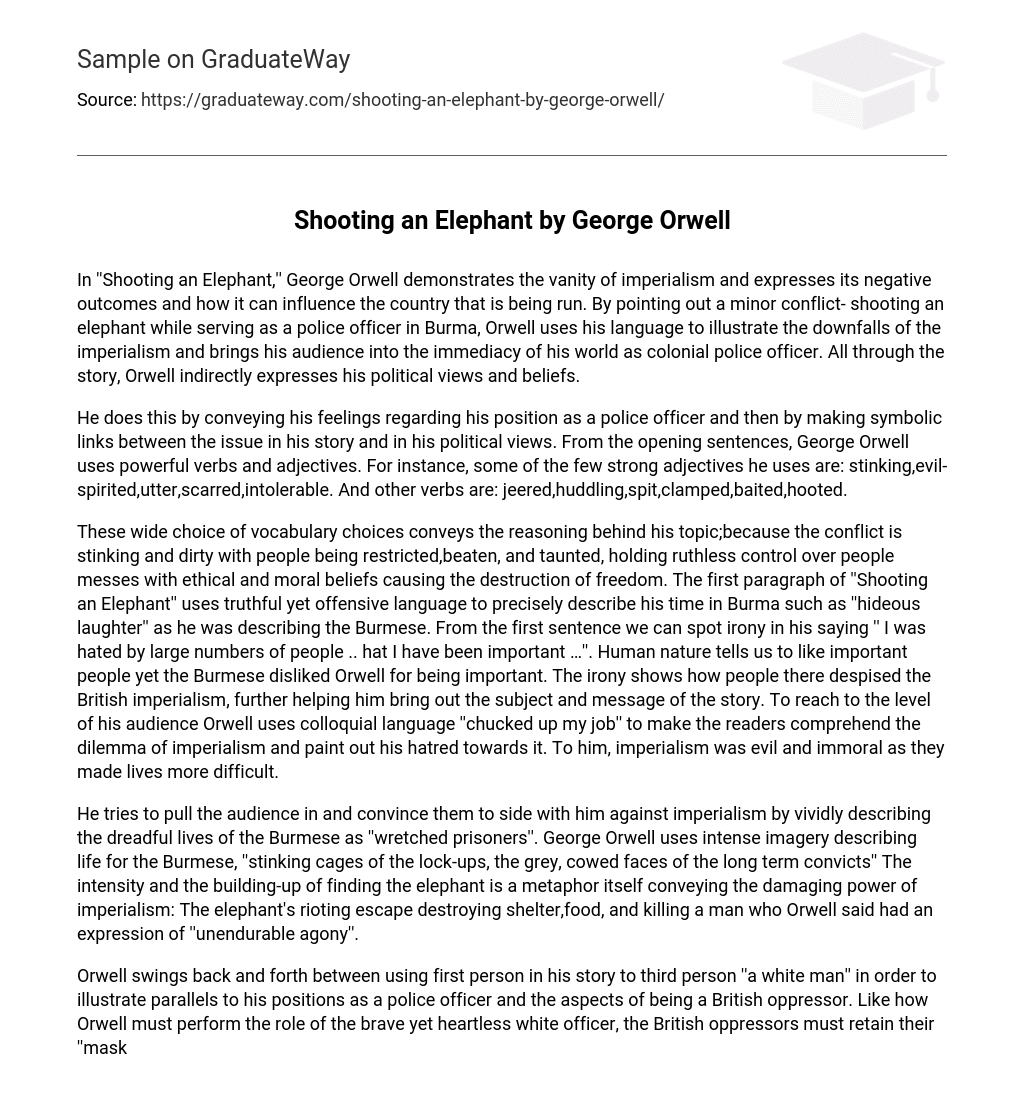George Orwell’s “Shooting an Elephant” showcases the emptiness of imperialism and its detrimental effects on the colony being governed. By highlighting a seemingly trivial situation – the need to shoot an elephant while working as a police officer in Burma – Orwell skillfully employs his language to depict the drawbacks of imperialism and immerse his readers in the experiences of a colonial police officer. Throughout the narrative, Orwell subtly conveys his political perspectives and convictions.
George Orwell’s narrative is a passionate expression of his emotions as a police officer. Throughout the text, he draws parallels between the issue at hand and his political perspective. To convey his feelings, Orwell uses strong verbs and adjectives like “stinking,” “evil-spirited,” “utter,” “scarred,” and “intolerable.” Furthermore, he employs verbs such as “jeered,” “huddling,” “spit,” “clamped,” “baited,” and “hooted.”
The extensive range of vocabulary choices used in the text expresses the rationale behind the author’s topic. This is because the conflict in Burma is characterized by unpleasant and unethical actions, such as restricting, beating, and taunting people. The ruthless control exerted over individuals challenges ethical and moral beliefs, ultimately leading to the destruction of freedom. In the first paragraph of “Shooting an Elephant,” truthful but offensive language is employed to precisely depict the author’s experiences in Burma. For example, he describes the Burmese with words like “hideous laughter.” Right from the start, irony is evident as he states, “I was hated by large numbers of people… that I have been important….” Normally, human nature dictates that we admire important individuals, yet in Orwell’s case, the Burmese despised him for his status. This irony highlights how the people in Burma detested British imperialism, thereby emphasizing the subject and message of his story. In order to effectively communicate with his audience, Orwell uses colloquial language like “chucked up my job,” aiming to make readers understand the dilemma of imperialism and express his own aversion towards it. In his view, imperialism was not only evil but also immoral, as it considerably exacerbated people’s lives.
The main idea of the text is that George Orwell uses vivid descriptions and intense imagery to convey the harsh reality of life for the Burmese people under imperialism. He tries to sway the audience to oppose imperialism by portraying the Burmese as “wretched prisoners” and depicting the bleak conditions in which they live. The metaphor of the elephant’s rampage symbolizes the destructive power of imperialism, as it destroys shelter, food, and causes the death of a man who is in “unendurable agony.”
Orwell alternates between employing first person narration in his story and third person description as “a white man” to highlight similarities between his experiences as a police officer and the characteristics of British oppressors. Just as Orwell must adopt the role of a courageous but unfeeling white officer, the British oppressors must maintain their “masks” as resolute performers, often sacrificing their own principles.
George Orwell had to go against his instincts and shoot the elephant in order to meet the people’s expectations, as depicted in Shooting an Elephant. In three paragraphs, Orwell described the prolonged death of the elephant using lengthy sentences that reflected his guilt and unbearable pain. Orwell remarked that “In that instant, in too short a time … terrible change had come over the elephant”.
The Burmese people rejoiced when Orwell was compelled to act against his desires. Orwell desired to assist others, but he found himself obligated to take a life in order to accomplish this. Ultimately, Orwell felt a sense of relief upon learning that the coolie had been killed by the elephant, as it provided him with justification for killing the elephant and alleviated some of his remorse. He came to understand that someone had to perish in order for him to safeguard the people, which is ironic. The irony lies in the fact that the fear of being mocked outweighs the fear of death itself.





